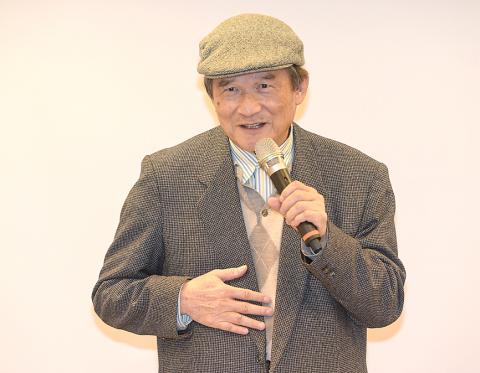Taiwan United Nations Alliance president Michael Tsai (蔡明憲) yesterday said he has renounced his Democratic Progressive Party (DPP) membership to protest the party’s decision to delay its presidential primary.
Tsai made the remarks in a written statement two days after the DPP Central Executive Committee pushed the date back to May 22.
The party’s initial schedule was for a five-member team to mediate between primary participants President Tsai Ing-wen (蔡英文) and former premier William Lai (賴清德) by yesterday, and that if mediation had failed, Tsai Ing-wen and Lai would have presented their views to the public today and tomorrow. Surveys would have been conducted over the following three days before the party headquarters was to announce its candidate on April 24.

Photo: Chang Chia-ming, Taipei Times
The rescheduling places the primary after the party is to nominate its legislative candidates, which some say would stack the deck in Tsai Ing-wen’s favor.
Michael Tsai, a former minister of national defense, urged the DPP leadership to respect the institution of the primary.
“The belief in fair, rules-based competition had always been part of the DPP’s core values,” he said.
However, the administration’s ineffectual implementation of transitional justice and judicial reform has resulted in “alienation and anxiety” among Taiwanese, to which the party leadership has become “indifferent,” he said.
Since Tsai Ing-wen led the DPP’s return to office in 2016, she has refused to respond to his advice regarding the promotion of a “Taiwanese nationalism,” regaining membership at the UN or bolstering the national defenses by employing partial conscription, Michael Tsai said.
“The pursuit of short-term political interests by its internal factions has consumed the party,” he said. “As a party member, I no longer have any power to advise it and therefore must register my deep pain and sorrow by leaving.”
“I am proud to have been a DPP member and to have fought the good fight for Taiwanese, but now I have to depart from the party that I grew up with,” Michael Tsai said. “I will be contributing what little power I have to my fatherland Taiwan from another place.”
“The DPP has my blessings and I sincerely hope it ... recovers its strength,” he said.

ANOTHER EMERGES: The CWA yesterday said this year’s fourth storm of the typhoon season had formed in the South China Sea, but was not expected to affect Taiwan Tropical Storm Gaemi has intensified slightly as it heads toward Taiwan, where it is expected to affect the country in the coming days, the Central Weather Administration (CWA) said yesterday. As of 8am yesterday, the 120km-radius storm was 800km southeast of Oluanpi (鵝鑾鼻), Taiwan’s southernmost tip, moving at 9kph northwest, the agency said. A sea warning for Gaemi could be issued tonight at the earliest, it said, adding that the storm is projected to be closest to Taiwan on Wednesday or Thursday. Gaemi’s potential effect on Taiwan remains unclear, as that would depend on its direction, radius and intensity, forecasters said. Former Weather Forecast

As COVID-19 cases in Japan have been increasing for 10 consecutive weeks, people should get vaccinated before visiting the nation, the Centers for Disease Control (CDC) said. The centers reported 773 hospitalizations and 124 deaths related to COVID-19 in Taiwan last week. CDC Epidemic Intelligence Center Director Guo Hung-wei (郭宏偉) on Tuesday said the number of weekly COVID-19 cases reported in Japan has been increasing since mid-May and surpassed 55,000 cases from July 8 to July 14. The average number of COVID-19 patients at Japan’s healthcare facilities that week was also 1.39 times that of the week before and KP.3 is the dominant

The Chinese Communist Party’s (CCP) working group for Taiwan-related policies is likely to be upgraded to a committee-level body, a report commissioned by the Mainland Affairs Council (MAC) said. As Chinese President Xi Jinping (習近平) is increasingly likely to upgrade the CCP’s Central Leading Group for Taiwan Affairs, Taiwanese authorities should prepare by researching Xi and the CCP, the report said. At the third plenary session of the 20th Central Committee of the CCP, which ended on Thursday last week, the party set a target of 2029 for the completion of some tasks, meaning that Xi is likely preparing to

US-CHINA TRADE DISPUTE: Despite Beijing’s offer of preferential treatment, the lure of China has dimmed as Taiwanese and international investors move out Japan and the US have become the favored destinations for Taiwanese graduates as China’s attraction has waned over the years, the Ministry of Labor said. According to the ministry’s latest income and employment advisory published this month, 3,215 Taiwanese university graduates from the class of 2020 went to Japan, surpassing for the first time the 2,881 graduates who went to China. A total of 2,300 graduates from the class of 2021 went to the US, compared with the 2,262 who went to China, the document showed. The trend continued for the class of 2023, of whom 1,460 went to Japan, 1,334 went to